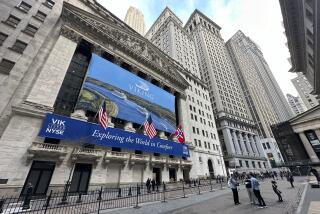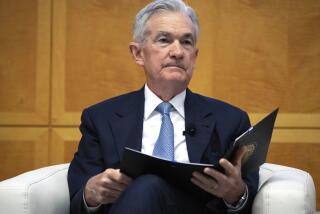Europe’s Central Bank Holds Key Rate Steady
- Share via
FRANKFURT — The European Central Bank left its main short-term interest rate unchanged Thursday at 2.5%, helping to drive the euro currency to a new four-year high against the dollar and sending European stocks lower.
But many analysts still expect the ECB to ease credit in coming months because of concerns that Europe’s economy is bordering on recession.
ECB President Wim Duisenberg appeared to signal the potential for a rate cut by saying that “downside risks remain” for the euro-zone economy, even though “looking ahead we continue to see a strengthening” from recent subdued growth.
The ECB also relaxed its inflation goal, saying it will aim for inflation of “close to 2%” instead of between zero and 2%. That change also paves the way for easier credit, analysts said.
“Rate cuts have been postponed, but only postponed,” said Holger Schmieding, an economist at Bank of America in London.
Separately on Thursday, Bank of England policymakers met and left their key rate unchanged as well, at 3.75%.
The ECB and Bank of England meetings followed the U.S. Federal Reserve’s meeting Tuesday. The Fed also left its main rate unchanged -- at 1.25% -- but surprised Wall Street by saying it was concerned about the potential for the economy to fall into a deflationary cycle.
The Fed’s comments suggested it could ease credit further, even with U.S. interest rates at 40-year lows.
The wide spread between U.S. rates and those in Europe and elsewhere have slammed the dollar in recent weeks, as many investors searching for higher yields have shunned U.S. fixed-income securities.
That was evident Thursday as the U.S. Treasury sold $18 billion of 10-year notes and saw the weakest demand since at least 1983, according to bond traders. The yield on the new notes was 3.7%.
Currency traders continued to push the dollar lower and the euro higher, betting that investors will be reluctant to buy U.S. assets, especially bonds. The euro hit a four-year high of $1.149, up from $1.137 on Wednesday.
The ECB decision on rates “makes the interest-rate differential that much more attractive,” said Alejandro Urbina, a currency strategist at Banc One Capital Markets in Chicago. “Capital is more likely to flow into euro-denominated assets.”
But that sentiment didn’t help European stocks, which fell broadly Thursday on disappointment that the ECB didn’t cut rates. The German market sank 4%, the French market lost 2.8% and Spain’s market fell 2%.
More to Read
Inside the business of entertainment
The Wide Shot brings you news, analysis and insights on everything from streaming wars to production — and what it all means for the future.
You may occasionally receive promotional content from the Los Angeles Times.










